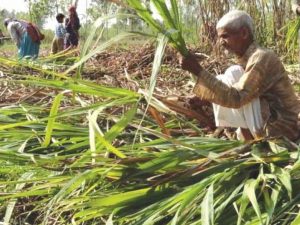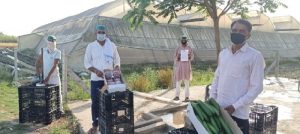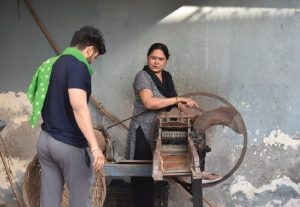 April 17 is the International Day of Peasant Struggle — a day to highlight the persecution and violence suffered by peasants and farmers around the world on a daily basis as a result of pro-corporates policies. Increasingly, peasant farmers and land-based peoples are facing grave catastrophes of human rights and dignity as big agribusiness, big dams, the global mining boom, and other mega-developments continue to put profits first and peasants last. In context of India such paradigm shift to pro-Industrialist approach may result in total collapse of our economy, which actually thrives on good and self-sufficient crops ensuring us food security and adding up to agri-export. But the farmers’ distress and their miseries multiplied multifold due to successive droughts, floods and hailstorms damaging their crops, depriving them of cash liquidity and now lockdown due to corona pandemic haunt their future into darkness.
April 17 is the International Day of Peasant Struggle — a day to highlight the persecution and violence suffered by peasants and farmers around the world on a daily basis as a result of pro-corporates policies. Increasingly, peasant farmers and land-based peoples are facing grave catastrophes of human rights and dignity as big agribusiness, big dams, the global mining boom, and other mega-developments continue to put profits first and peasants last. In context of India such paradigm shift to pro-Industrialist approach may result in total collapse of our economy, which actually thrives on good and self-sufficient crops ensuring us food security and adding up to agri-export. But the farmers’ distress and their miseries multiplied multifold due to successive droughts, floods and hailstorms damaging their crops, depriving them of cash liquidity and now lockdown due to corona pandemic haunt their future into darkness.
Realising the tough times of corona global pandemic, even the US President Donald Trump announced a $19 billion bailout package for farmers hurt financially by the coronavirus crisis. The aid plan includes $16 billion in direct payments to farmers to boost their incomes, along with $3 billion in government purchases of meat, dairy products and other foods. US Agriculture Department will receive another $14 billion in July for further assistance. Most of the other countries have followed the same suit. But in India they are vigorously struggling to have a bailout economic package from the Prime Minister Narendra Modi in troubled times as they suffered a lot during continuing countrywide lockdown.
The lockdown had become havoc for the farmers whose wheat crop was just ripe for cutting. The country was heading for a record Rabi production of nearly 150 million tonnes to take India’s annual food grain output to an all-time high 292 million tonnes in 2019-20 even as the country eyes a massive target of 298 million tonnes in the coming crop year. All such projection suffered due to sudden lockdown crippling the movement and availability of labour force to execute cutting and marketing operations. The natural calamity of hailstorm destroyed substantial ripe crops in the field resulting in heavy economic losses.
The worst effect of lockdown was seen among the rural folks who suffered enormously. All restaurants, food joints, hotels, malls have been closed down. It declined the demand of fruits and vegetables. The fields full with crops of cauliflower, peas, mushrooms, tomatoes started rotting without giving any income. The fruits like grapes, bananas, early variety of mangos, oranges and guavas too meted unfortunate fate. The farmers fed strawberry to their cattle and other animals. The cultivators of exquisite flowers were worst victims as most of the weddings and social festivals schedules were cancelled. They experienced agony of beautiful flowers dying in the field in front of their deserted eyes that completely shattered their economy.
The farm crisis slashed the prices of their hard-earned produce incurring unimaginable huge losses. The poultry business too suffered heavy losses. Fish, egg and chicken prices went gone down due to breakdown of supply chain as a consequence of complete halt of transport facilities. Milk producers were also worst sufferers as they had to sell milk at a loss of 10-15 a liter in the village. The non-availability of stranded migrant labour further aggravated the farm crisis.
On the clarion call of the Bhartiya Kisan Union (Apolitical) (BKU), the biggest representative body of farmers’ rights, the Indian farmers collectively commemorated the International Day of Peasants’ Struggle in different parts of the country, including Uttar Pradesh without flouting lockdown. They want 1.5 lakh crore special bailout packages for the revival of farm sector. On this day Indian farmers around hundreds of villages came in their balconies and doors with agriculture tools in hand to reiterate their demand for 1.5 lakh crore special economic packages from the Prime Minister Narendra Modi. Expressing solidarity for their demand the farmers also clicked photos with agriculture tools and posted on various online social media platforms.
Unique protest of farmers erupted in wake of irreparable losses to their crops and marketing of produces due to nationwide lockdown crippling their routine movement and life to an unimaginable halt. The government failed to provide any effective relief to such farmers whose life ruined them during COVID-19 pandemic lockdown. They lodged protest and dissatisfaction on twitter trend “#StayHomeButNotSilent.” On International Day of Peasant Struggle, the BKU has urged its members and allies to stay home and follow lockdown but not sit in silence and decry farmers’ suicide, evictions due to arbitrary land acquisition and economic blockades.
“We appealed the people to highlight and expose the persecution, continued criminalisation of peasant struggles, and highlight the precarious conditions of rural economies. Deepening crisis shows us once again the need to enact a profound change in the capitalistic mindset dominated system. Present system is untenable and incompatible with nature and life,” emphasized Chaudhari Rakesh Tikait, National Spokesperson of the BKU in a conversation with Tehelka.
“It is time to introduce structural transformations in the agri-food systems, and not just push for more aid programs. The quarantine and the historical neglect of peasant agriculture can have serious consequences that can aggravate the problem of hunger worldwide,” he added while highlighting the distresses faced by the Indian farmers. “Our task as farmers is to feed the people, and we want to continue doing so. We understand that the production of healthy food cannot cease and that it is the first line of defence against COVID-19. However, this requires providing safe and dignified living conditions for peasants, during and after the crisis, Tikait emphatically asserted.
Bhartiya Kisan Union (Apolitical) sent a memorandum to Prime Minister Narendra Modi highlighting major demands of Indian Farmers including Rs. 1.5 lakh crore (5 per cent of GDP) special bailout package for helping farmers during this pandemic. Other demands include procurement points at village level and agri-goods to be at MSP rate, farmers producing vegetables, fruits and flowers should be assisted and these perishable produces should be procured from the doorstep at the village. They want at the same time the minimum support price for these perishable items should also be announced to check exploitation of farmers and consumers who get these items at a four times high rates.
The other prominent leader of BKU Dharmendra Malik told, “We also advised the government that instead of dependence on imports of agri-goods it must give incentives to our farmers to grow ourselves. The procurement of milk must be done from their village through dairy cooperative to support Dairy farmers.” “A few months back, farmers suffered heavy loss due to heavy hailstorm and rain. The government should exempt electricity and water charges and interest on bank loans for a year and reinvestment in public policies for Health, Education, Labour and the rural areas, as a priority,” He pleaded.
All India Kisan Sangharsh Coordination Committee (AIKSCC), is an umbrella organization of more than 250 farming organizations across 21 States and a few union territories, wrote a letter to Prime Minister demanding to remove hurdles coming in the way of ongoing Rabi harvesting season due to the lockdown of the country due to COVID 19 and lift the lockdown for farmers in its letter and spirit to remove all the hurdles in harvesting.
Demanding to mitigate the hardships of the farmers in these exasperating times the AIKSCC Convener and prominent leader of the cane growers V.M. Singh expressed the need that 100 per cent produce of the farmers be procured by the Government from the field and Minimum Support Price (MSP) must be fixed by the Central Government to protect him from losses and exploitation by the market forces. “If the Central or the State Governments are not in a financial position to procure the entire produce then orders must be issued that the private traders cannot purchase the produce below the MSP. It is need of the hour that MSP for fruits and vegetables be declared as an emergency measure to save the farmers in this crisis,” he added saying that farmers are hopeful for a favourable action from the prime minister.
“There are no takers for vegetables which are rotting, bananas are being sold for 2 to 4/ a kg and the consumer is paying a heavy price for his food, all this at a time when the nation needs vegetables and fruits to enhance their immunity to fight the virus,” added Mr Singh, urging the PM that in such an emergency situation Union government must
determine MSP for fruits and vegetables immediately to save the farmers from exploitation.
Uttar Pradesh has 119 sugar mills of which 94 owned by private sector. These mills have already paid 15,646 crores to the farmers as cane price, which is approximately 57 per cent of the total cane dues. However the outstanding dues have mounted to a whopping 12,500 crore presently and about 250-300 crores liabilities it carry for the previous crushing session. With almost a month to go before the season ends, it is anybody’s guess what the final figure may end up in these tough times.
 The observers predict an explosive situation in sugar industry as an aftermath of Covid-19. The farmers of western UP complain about non-procurement of their sugarcane crop because of their enhanced production achieved using high yielding improved variety and their basic quota remained 80 percent less. It becomes a losing proposition for them in terms of generation of additional income. They demand fresh assessment of their cane production for procurement by nearby sugar mills. The farmers also blamed government’s apathy for recovering their dues.
The observers predict an explosive situation in sugar industry as an aftermath of Covid-19. The farmers of western UP complain about non-procurement of their sugarcane crop because of their enhanced production achieved using high yielding improved variety and their basic quota remained 80 percent less. It becomes a losing proposition for them in terms of generation of additional income. They demand fresh assessment of their cane production for procurement by nearby sugar mills. The farmers also blamed government’s apathy for recovering their dues.
Uttar Pradesh has around 16 crores farmers out of which three crores depend on sugar cane farming. The state is the largest cane growing state of India, accounts for 43 per cent (about 2 million hectares) of the national cane acreage and about 39 per cent of the national sugarcane production. UP is anticipating around 12 million tonnes of sugar this year. It has accomplished the gigantic task to make online around 150 million annual transactions/ interactions between 3.0 million sugarcane farmers, 119 sugar mills and 168 cane cooperative societies engaged in the marketing of sugarcane worth 1,50,000 million (US$ 3000 million) annually.
The Yogi Adityanath government in Uttar Pradesh has decided to give sugar to ‘willing cane farmers’ in lieu of their balance cane price of season 2019-20. The UP cane commissioner Sanjay Bhoosreddy said the decision has been taken on the demand of sugarcane farmers. Each farmer can take one quintal (2 bags of 50 kg each) sugar from sugar mill, after dropping his/her sugarcane while going back home following social distance norms, in lieu of their balance cane dues payment of the 2019-20 season.
A majority of sugar companies decided to make hand sanitisers to supply to hospitals by using a part of the ethanol/ENA production, thereby ensuring that the country does not face any shortage of good quality hand sanitisers. “Sugar sales are just not happening. Institutional sale of sugar, which accounts for almost 65-70 per cent of our domestic sale, has dried up in the wake of Covid lockdown. Also, sugar exports are also not happening owing to restrictions on the movement of vehicles, unavailability of labour at the ports and also because the movement of ships and containers has been halted due to restrictions” said a spokesperson of Indian Sugar Mills’ Association (ISMA).
“Sugar sales/dispatches too got affected due to the country-wide lockdown and consequent closure of restaurants, malls, movie halls, which in turn has impacted the demand for sugar sweetened products like ice cream, beverages, juices, confectioneries and sweets,” it contended. ISMA expects that as soon as the lockdown is lifted, there can be an increase in sugar demand, especially from the bulk consumers when their operations resume.
The Agriculture Ministry disclosed second advance crop estimates at recently held national Kharif conference on 17 April suggesting bumper wheat production of 106.21 million tonnes this year. It would achieve Rabi output of 149.6 million tonnes compared to 139 million tonnes in the previous Rabi season. Wheat production last year was around 99 million tonnes. Almost all major Rabi crops this season did better than last year. The most
inspiring result was of winter rice, with output slated to be 15.53 million tonnes as against 13.63 million tonnes in the previous season; maize was 8 million tonnes (7.58 million tonnes in 2019 season); and sorghum stood at 2.66 million tonnes (1.84 million tonnes).
For the next year, States have been given the target of producing 298 million tonnes (2020-21). While the target for rice and wheat remains more or less the same as 2019-20, targets for coarse cereals and pulses are up by nearly 3.5 million tonnes and 2.5 million tonnes, respectively, at 48.7 million tonnes and 25.6 million tonnes, said Agriculture Commissioner SK Malhotra at the conference.
 The Uttar Pradesh government has done elaborate arrangements for procurement of wheat by authorising ten agencies nominated to procure about 55 lakh metric tonnes of wheat in this Rabi session through 5000 purchase centers established in the state. The UP government decided 1925 per quintal as minimum support price for farmers. The purchase would be done online as more than 232154 farmers have registered to sell wheat. It had procured about 98446.83 metric tonnes till date and the process will continue till 20th June, 2020. The money would be directly paid online in the respective accounts of the farmers.
The Uttar Pradesh government has done elaborate arrangements for procurement of wheat by authorising ten agencies nominated to procure about 55 lakh metric tonnes of wheat in this Rabi session through 5000 purchase centers established in the state. The UP government decided 1925 per quintal as minimum support price for farmers. The purchase would be done online as more than 232154 farmers have registered to sell wheat. It had procured about 98446.83 metric tonnes till date and the process will continue till 20th June, 2020. The money would be directly paid online in the respective accounts of the farmers.
Despite best efforts of the Union and State governments, the farmers are facing difficulties in transporting their produce to procurement centers. They had to face wrath of local policemen who misbehave and use filthy language. Many video clips of such incidences went viral showing how they were beaten while performing agricultural work in their fields.
The Indian farmers created history through Green and White Revolutions making our country self-sufficient in food grain production.
The policy makers gave special thrust to Farmers First policies by subsidising good varieties of seeds, fertilizers, pesticides, water, irrigation and electricity to tubewells. Big dams and canals were constructed. Indians were forced to eat rotten red wheat received as charitable gesture to feed poor from an advanced country actually used to feed their cattle.
Our farmers turned the tables on just one call from then Prime Minister Lal Bahadur Shastri who gave slogan- Jai Jawan — Kai Kisan and appealed the nation to become self-sufficient in food grain production during 1965 Indo-Pak war. Now in the troubled times of Covid-19 only trusted mantra of “Farmers First” could revive our economy as other sectors have already add up to miseries of heavy unemployment.
letters@tehelka.com













